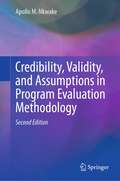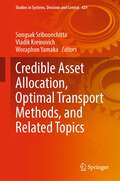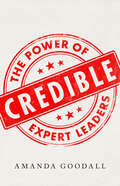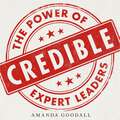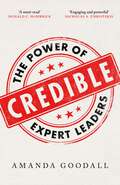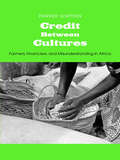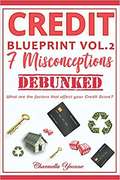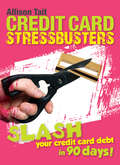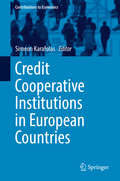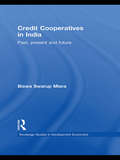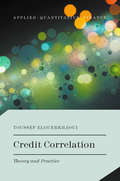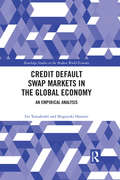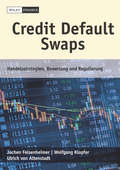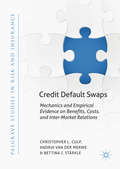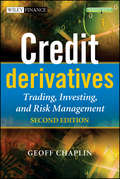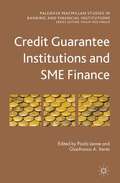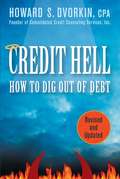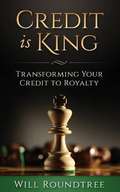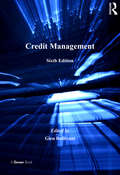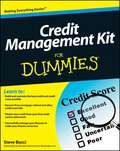- Table View
- List View
Credibility, Validity, and Assumptions in Program Evaluation Methodology
by Apollo M. NkwakeThis book focuses on methods of choice in program evaluation. Credible methods choice lies in the assumptions we make about the appropriateness and validity of selected methods and the validity of those assumptions. As evaluators make methodological decisions in various stages of the evaluation process, a number of validity questions arise. Yet unexamined assumptions are a risk to useful evaluation. The first edition of this book discussed the formulation of credible methodological arguments and methods of examining validity assumptions. However, previous publications suggest advantages and disadvantages of using various methods and when to use them. Instead, this book analyzes assumptions underlying actual methodological choices in evaluation studies and how these influence evaluation quality. This analysis is the basis of suggested tools. The second edition extends the review of methodological assumptions to the evaluation of humanitarian assistance. While evaluators of humanitarian action apply conventional research methods and standards, they have to adapt these methods to the challenges and constraints of crisis contexts. For example, the urgency and chaos of humanitarian emergencies makes it hard to obtain program documentation; objectives may be unclear, and early plans may quickly become outdated as the context changes or is clarified. The lack of up-to-date baseline data is not uncommon. Neither is staff turnover. Differences in perspective may intensify and undermine trust. The deviation from ideal circumstances challenges evaluation and calls for methodological innovation. And how do evaluators work with assumptions in non-ideal settings? What tools are most relevant and effective? This revised edition reviews major evaluations of humanitarian action and discusses strategies for working with evaluation assumptions in crises and stable program settings.
Credible Asset Allocation, Optimal Transport Methods, and Related Topics (Studies in Systems, Decision and Control #429)
by Vladik Kreinovich Songsak Sriboonchitta Woraphon YamakaThis book describes state-of-the-art economic ideas and how these ideas can be (and are) used to make economic decision (in particular, to optimally allocate assets) and to gauge the results of different economic decisions (in particular, by using optimal transport methods). Special emphasis is paid to machine learning techniques (including deep learning) and to different aspects of quantum econometrics—when quantum physics and quantum computing models are techniques are applied to study economic phenomena. Applications range from more traditional economic areas to more non-traditional topics such as economic aspects of tourism, cryptocurrencies, telecommunication infrastructure, and pandemic. This book helps student to learn new techniques, practitioners to become better knowledgeable of the state-of-the-art econometric techniques, and researchers to further develop these important research directions
Credible: The Power of Expert Leaders
by Amanda GoodallA leading business expert shows why expertise really matters, and how leaders who deeply understand the nuts and bolts of their industry and organization-- from businesses, to hospitals, to universities, to sports-- make all the difference for its success and the happiness of people who work there. Amanda Goodall has spent a decade researching what makes organizations tick, everywhere from the business world to hospitals and healthcare systems, football and basketball teams, and Formula 1 organizations. By debunking the cult of managerialism (the notion that smart people can run anything and the emphasis on leadership personality), Goodall reshapes our understanding of bosses and the traits necessary for organizational success. She identifies the key characteristics of expert leaders and provides a real and grossly underappreciated model for career success: "go deep into a business, work hard, pay attention, and know your stuff." Those who run hospitals and healthcare systems, for example, should be physicians with deep clinical expertise, not financiers or people parachuted in from other industries. Those who run school systems and universities need to understand from experience the stress of balancing teaching, research, and student welfareCredible demonstrates categorically that expertise matters more than ever and that we need our leaders to be experts with a deep, understanding of their organizations from many years spent learning the business and working their way up the ladder. The people who work for them are happier because they feel better understood and the organizations they lead are more successful.
Credible: The Power of Expert Leaders
by Amanda GoodallWhat makes a leader credible?Who would be an expert in a world where expertise is under siege? Hard-won know-how and experience seem to count for nothing in the eyes of everyone from high-profile business leaders to populist politicians. But what evidence do we have that this perception is right? Amanda Goodall has been asking this question for the last twenty years. Her research has taken her from boardrooms and F1 race tracks to hospitals and higher education. She has proven time and again that, when it comes to top performance, we need people - especially bosses - with the expertise that only comes from a deep understanding of the worlds in which they operate. That's what makes the people around them feel happier, better appreciated and more productive.In Credible, Goodall identifies the key characteristics of expert leaders and provides a model for career development and success based on going deep into a business, working hard and knowing your stuff. We all want to be led by people we can relate to and trust, people who have the credibility to make us want to follow them. When it comes to credible leadership, expertise really matters.(P) 2023 Hodder & Stoughton Limited
Credible: The Power of Expert Leaders
by Amanda GoodallWINNER OF THE SABEW MANAGEMENT AND LEADERSHIP BUSINESS BOOK AWARD'Thought-provoking' Wall Street Journal'A must-read' Donald C. Hambrick'Insightful . . . reminds us why and how expertise matters' Herminia Ibarra What makes a great leader? This is the question Amanda Goodall has been asking for the last twenty years. From boardrooms and F1 race tracks to healthcare and scientific innovation, her research has proven time and again that when it comes to leadership, we need bosses with a deep understanding of the worlds in which they operate. That's what makes the people around them feel happier, more motivated and productive.Credible identifies the key characteristics of good leaders and a new model for career success, by combining expertise with the leadership development experts need to succeed.In a world short of trust, Goodall shows us that when it comes to leadership, credible experts are needed more than ever.
Credit Between Cultures: Farmers, Financiers, and Misunderstanding in Africa
by Parker ShiptonParker Shipton brings a variety of perspectives--cultural, economic, political, and religious-philosophical--and years of field experience to this fascinating study about people who borrow and lend in the interior of Africa. His conclusions challenge the conventional wisdom of the past half century (including perennial World Bank orthodoxy) about the need for credit among African farming people.
Credit Blueprint Vol 2: 7 Misconceptions Debunked: What are the factors that affect Credit Score?
by Charmella Y SmithCredit is King and there is nothing anyone can do to change that! Now is the time to accept what you don't know and Learn what you need to know while; Credit affects every aspect of your life: Employment, Insurance, Automobile and Home Loans.Our future is predicated on the dollar have less value and our ability to build excellent Credit and master leveraging it! Credit Blueprint breaks down the most common 'Misconceptions' debunking them so, that you gain knowledge and become a master architect of your Financial future Creating the life you WORK for and Deserve!
Credit Booms and Lending Standards: Evidence from the Subprime Mortgage Market
by Giovanni Dell'Ariccia Luc Laeven Deniz IganA report from the International Monetary Fund.
Credit Card Pricing
by Harborne W. Stuart Jr.Supplements Pricing for Profit: The UK Credit Card Industry in the Late 1980s (A).
Credit Card Stressbusters
by Allison TaitFeeling overwhelmed by your credit card debt? Struggling to pay off your card each month? Wanting to get back in the black but don't know how? Fortunately, help is now at hand with Credit Card Stressbusters. This plain-English, Q&A guide will help you to slash your credit card debt in just 90 days. Not only will you learn how to cure credit card addiction, but you’ll also learn some of the best-kept stressbusting secrets for using your card responsibly. Inside you’ll discover: how to choose the right card -- credit or otherwise how to control your spending, instead of letting it control you how to reduce your debt -- fast how to make your credit card work for you. Whether you’re struggling with credit card chaos or just trying to stay ahead, Credit Card Stressbusters is the book for you!
Credit Conditions and Recoveries from Recessions Associated with Financial Crises
by Prakash KannanA report from the International Monetary Fund.
Credit Cooperative Institutions in European Countries (Contributions to Economics)
by Simeon KarafolasThis book offers a comparative analysis of credit cooperative systemsacross 23 European countries. Cooperative banking has an important place in thefinancial, economic and social life of most European countries, and whilecooperative banks, credit mutuals, credit cooperatives and credit unions sharethe spirit of cooperation and mutuality, they often have very differentfeatures, history and development. The book examines the evolution and currentmodel of each credit cooperative system, its importance for the national andlocal banking markets, as well as the impact of the financial crisis oncooperative banking, and also presents the sharp contrasts between thesesystems throughout the EU. It is of significant scientific and practicalinterest and enables policymakers, practitioners and academics at European andnational levels to deepen their understanding of the evolution of the systemand its governance.
Credit Cooperatives in India: Past, Present and Future (Routledge Studies in Development Economics)
by Biswa Swarup MisraCredit cooperatives in India make up one of the largest rural financial systems in the world. Playing a vital role in dispensing credit in largely agricultural areas, they are also the weakest link in the formal credit delivery system. This book provides a valuable case study of the traditional banking system in this developing economy, exploring the reasons for the poor performance of credit cooperatives in India and suggesting measures to revitalise them. Although this sector has grown along with the micro-credit sector to provide finance for the poor and the less creditworthy borrowers, financing development still remains a major problem in the developing world. However, the financial health of credit cooperatives in India has been a matter of perennial concern. The author argues that cooperatives hold great promise for financial inclusion if the financial position of the cooperatives can be consolidated. Providing a detailed analysis of the historical evolution of cooperatives in India, the book establishes the link between different segments of this institutional system and their performance in a commercial sense to show that cooperatives occupy an important place in India’s financial edifice as they play a key role in the multi-agency framework for rural credit delivery. As such, the analysis provides a valuable reference for scholars of economics, Asian economics and finance.
Credit Correlation: Theory and Practice (Applied Quantitative Finance)
by Youssef ElouerkhaouiThis book provides an advanced guide to correlation modelling for credit portfolios, providing both theoretical underpinnings and practical implementation guidance. The book picks up where pre-crisis credit books left off, offering guidance for quants on the latest tools and techniques for credit portfolio modelling in the presence of CVA (Credit Value Adjustments). Written at an advanced level, it assumes that readers are familiar with the fundamentals of credit modelling covered, for example, in the market leading books by Schonbucher (2003) and O'Kane (2008). Coverage will include the latest default correlation approaches; correlation modelling in the 'Marshall-Olkin' contagion framework, in the context of CVA; numerical implementation; and pricing, calibration and risk challenges. The explosive growth of credit derivatives markets in the early-to-mid 000's was bought to a close by the 2007 financial crisis, where these instruments were held largely to blame for the economic downturn. However, in the wake of increased regulation across all financial instruments and the challenge of buying and selling bonds in large amounts, credit derivatives have once again been found to be the answer and the market has grown significantly. Written by a practitioner for practitioners, this book will also interest researchers in mathematical finance who want to understand how things happen and work 'on the floor'. Building the reader's knowledge from the ground up, and with numerous real life examples used throughout, this book will prove a popular reference for anyone with a mathematical mind interested credit markets.
Credit Default Swap Markets in the Global Economy: An Empirical Analysis (Routledge Studies in the Modern World Economy)
by Shigeyuki Hamori Go TamakoshiThis book provides a comprehensive overview for various segments of the global credit default swap (CDS) markets, touching upon how they were affected by the recent financial turmoil. The book uses empirical analysis on credit default swap markets, applying advanced econometric methodologies to the time series data. It covers not only well-studied sovereign credit default swap markets but also sector credit default swap indices (i.e., CDS index for the banking sector) and corporate credit default swap indices (i.e., Markit iTraxx Japan CDS index), which have not been fully examined by the previous literature. The book also investigates causality and co-movement among several credit default swap markets, or between CDS and other financial markets.
Credit Default Swaps: Handelsstrategien, Bewertung und Regulierung
by Jochen Felsenheimer Wolfgang Klopfer Ulrich von AltenstadtDas Buch vermittelt erst ein grundlegendes Verständnis für Entwicklung, Funktionsweise und regulatorisches Umfeld von Credit Default Swaps (CDS). Anschließend werden die Modellierung und Bewertung von CDS, konkrete Spezialfälle und der Einsatz im Portfoliomanagement erläutert.
Credit Default Swaps: Mechanics and Empirical Evidence on Benefits, Costs, and Inter-Market Relations (Palgrave Studies in Risk and Insurance)
by Christopher L. Culp Andria van der Merwe Bettina J. StärkleThis book, unique in its composition, reviews the academic empirical literature on how CDSs actually work in practice, including during distressed times of market crises. It also discusses the mechanics of single-name and index CDSs, the theoretical costs and benefits of CDSs, as well as comprehensively summarizes the empirical evidence on important aspects of these instruments of risk transfer. Full-time academics, researchers at financial institutions, and students will benefit from the dispassionate and comprehensive summary of the academic literature; they can read this book instead of identifying, collecting, and reading the hundreds of academic articles on the important subject of credit risk transfer using derivatives and benefit from the synthesis of the literature provided.
Credit Derivatives
by Geoff ChaplinThe credit derivatives industry has come under close scrutiny over the past few years, with the recent financial crisis highlighting the instability of a number of credit structures and throwing the industry into turmoil. What has been made clear by recent events is the necessity for a thorough understanding of credit derivatives by all parties involved in a transaction, especially traders, structurers, quants and investors. Fully revised and updated to take in to account the new products, markets and risk requirements post financial crisis, Credit Derivatives: Trading, Investing and Risk Management, Second Edition, covers the subject from a real world perspective, tackling issues such as liquidity, poor data, and credit spreads, to the latest innovations in portfolio products, hedging and risk management techniques. The book concentrates on practical issues and develops an understanding of the products through applications and detailed analysis of the risks and alternative means of trading. It provides: a description of the key products, applications, and an analysis of typical trades including basis trading, hedging, and credit structuring; analysis of the industry standard 'default and recovery' and Copula models including many examples, and a description of the models' shortcomings; tools and techniques for the management of a portfolio or book of credit risks including appropriate and inappropriate methods of correlation risk management; a thorough analysis of counterparty risk; an intuitive understanding of credit correlation in reality and in the Copula model. The book is thoroughly updated to reflect the changes the industry has seen over the past 5 years, notably with an analysis of the lead up and causes of the credit crisis. It contains 50% new material, which includes copula valuation and hedging, portfolio optimisation, portfolio products and correlation risk management, pricing in illiquid environments, chapters on the evolution of credit management systems, the credit meltdown and new chapters on the implementation and testing of credit derivative models and systems. The book is accompanied by a website which contains tools for credit derivatives valuation and risk management, illustrating the models used in the book and also providing a valuation toolkit.
Credit Guarantee Institutions and SME Finance
by Paola Leone Gianfranco A. VentoThis book analyses and confronts the functioning of guarantee systems for SMEs in countries where these schemes had an important development. The book also highlights how the current financial crisis is modifying the guarantees schemes, through policy maker interventions.
Credit Hell: How to Dig Out of Debt
by Howard S. DvorkinPersonal Finance Each year, millions of Americans sink further into debt and the sad truth is that most Americans have been conditioned to believe that debt is a normal part of life. If credit problems are adversely affecting your life, there are ways to improve your financial situation, and this revised and updated edition of Credit Hell: How to Dig Out of Debt can show you how. Written by Howard S. Dvorkin—a nationally known expert in the debt counseling field—Credit Hell walks you through the “getting-out-of-debt” process from assessing the state of your finances and developing a budget, to negotiating with your creditors, consolidating your debts, and rebuilding your finances after your money troubles are over. Filled with in-depth insights and practical advice, this user-friendly guide: * Explains, in straightforward terms, the Credit Card Accountability, Responsibility, and Disclosure Act of 2009 and details the major benefits of this new law * Shows you how to deal with important debts like your mortgage, car loans, and taxes owed to the IRS * Discusses why having a good credit history and a high credit score are important; how to order your credit report from each of the three national credit reporting agencies; and what you can do to improve your score and correct problems in your credit records * Educates you about important laws that can protect you when applying for credit, using credit, or if a debt collector is hounding you * Reveals when filing for bankruptcy is your best option and provides you with an overview of the process If you want to dig yourself out of debt and stay out of debt in the future, pick up the updated edition of Credit Hell and discover the best way to regain control of your financial life.
Credit Is King: Transforming Your Credit To Royalty
by Will RoundtreeWe need credit for everything nowadays, whether it's to buy a house, car or make a loan. As you grow older, your needs change and so does your credit. Analyzing your own credit can be difficult if you don't understand what it entails. This book will teach you the importance of credit and al the factors involved from credit scores, debt, credit cards and credit mistakes that contribute or can destroy ones' credit. In the end, you will learn how credit matters in not just the major decisions you make, but for the minor ones as well. Credit Is King and there is no better leverage to going your financial empire and building generational wealth.
Credit Management
by Glen BullivantFirst Published in 2016. Routledge is an imprint of Taylor & Francis, an Informa company.
Credit Management Kit For Dummies
by Steve BucciThe painless way to manage credit in today's financial landscape People with great credit scores are getting turned down for credit cards and loans for homes and cars. What do they need besides a good score? What are lenders looking for now that they are extremely risk-averse? Repairing broken or damaged credit is one thing, but having to meet today's much stiffer credit standards requiring that consumers consistently manage their credit is another thing all together. Credit Management Kit For Dummies gives you answers to these questions and insight into these concerns, and also walks you down the correct path to credit application approval. You'll discover major changes with the Credit CARD (Credit Accountability, Responsibility, and Disclosure) Act provisions and the new Consumer Financial Protection Legislation Agency; the effect of tightened credit markets on those with good, marginal, or bad credit; new rules and programs including Hope and Government options via the Obama Administration; the best ways to recover from mortgage related credit score hits; tips for minimizing damage after walking away from a home; credit score examples with new ranges; and much more. The pros and cons of credit counselors The quickest and most effective way to undo damage from identity theft Advice and tips about adding information to a credit report, and beefing-up thin credit Guidance for evaluating your Credit Score in today's economy Fannie Mae's revised guidelines for purchasing mortgages Information on significant others (boyfriend/girlfriend/spouse) and credit and debt sharing IRS exceptions to the Mortgage Forgiveness Debt Relief Act in a mortgage meltdown situation Not just for those who have bad credit and need to repair it, Credit Management Kit For Dummies also serves as an invaluable resource for those with average credit who want, or need, to manage it to get a job, reduce insurance costs, qualify for banking products, and more.
Credit Market in Morocco: A Disequilibrium Approach
by Nada Oulidi Laurence AllainA report from the International Monetary Fund.
Credit Matters: Empirical Evidence on U.S. Macro-Financial Linkages
by Tamim Bayoumi Ola MelanderA report from the International Monetary Fund.
